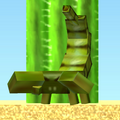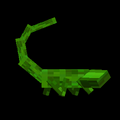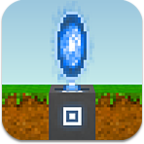Scorpion: Difference between revisions
>WhittleMario |
>McClaw |
||
| Line 13: | Line 13: | ||
Scorpions spawn near [[cacti]] and therefore are mostly found in [[desert]]s, although they can wander to adjacent [[biome]]s. | Scorpions spawn near [[cacti]] and therefore are mostly found in [[desert]]s, although they can wander to adjacent [[biome]]s. | ||
After initial [[world]] generation, scorpions require a cactus of at least 20 in-game days old to spawn. Scorpion spawning will typically happen just before the cactus dies. | After initial [[world]] generation, scorpions require a cactus of at least 20 in-game days old to spawn. Scorpion spawning will typically happen just before the cactus dies. (Note that cacti planted in [[compost]] do not die of old age.) | ||
==Behavior== | ==Behavior== | ||
Latest revision as of 06:23, 3 August 2016
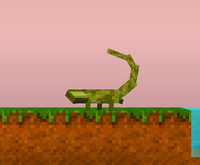
A scorpion is one of the hostile animals in the game. A single scorpion won't cause significant trouble for a healthy blockhead. They may cause problems for the wounded or when multiple scorpions are encountered, particularly at night. They were introduced in version 1.5.
Appearance
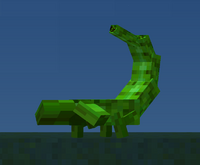
Scorpions are a vivid green color that's relatively easy to see, particularly against desert sand. They have six legs, a tail that curves up to point forward, and blocky pincers in front. They are about one block tall overall.
While they are not light sources, scorpions are not concealed in shadows and remain visible no matter how dark their surroundings. Only the presence of foreground objects can conceal them.
The HD version has a mean-looking, fanged face between its pincers.
Where Found
Scorpions spawn near cacti and therefore are mostly found in deserts, although they can wander to adjacent biomes.
After initial world generation, scorpions require a cactus of at least 20 in-game days old to spawn. Scorpion spawning will typically happen just before the cactus dies. (Note that cacti planted in compost do not die of old age.)
Behavior
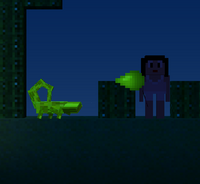
Scorpions wander the ground aimlessly. Like other creatures, they do not pass two-block high level changes on their own.
During the day, scorpions do not routinely attack nearby blockheads. Remaining near one or encountering large groups of them is still inadvisable, as they may stab a blockhead if adjacent (a poison drop may be visible momentarily) and the increased numbers make those attacks more likely.
At night, scorpions become extremely hostile, attacking at long range with their poison, capable of inflicting massive damage to a blockhead over a short period of time. It fires a poison every one second and will begin to chase a blockhead while firing its poison. The real trouble happens when a blockhead gets injured and becomes slow to run away, in which case scorpions are an immediate threat. Scorpions are able to kill a blockhead within a matter of seconds.
They will respond to attacks by launching a large drop of poison at their assailant. This is able to harm blockheads at least 10 blocks away.
When it is attacking, a scorpion's tail will flick in a jabbing motion. This will resemble either a stab against an adjacent blockhead or a catapult-like throw for a ranged attack.
Scorpions do not attack other creatures.
Health
- See also: Creature Hit Chart
Due to their ability to attack at range, it's difficult to kill scorpions without the attacking blockhead taking harm.
Scorpions are not affected by heat or cold, but can drown if submerged in water.
Harvesting
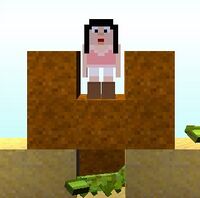
Scorpions can be difficult to kill, as they have have attacks that can severely wound blockheads. Even the strongest weapons may require two blows to kill one, and, as scorpions almost always retaliate, using weak weapons against one is not advised. Confronting one scorpion at a time reduces the risk significantly.
It is possible to trap a scorpion to make it easier to kill. The pictured method is to dig one block down and stack two blocks next to it. The scorpion can then be trapped and killed without moving away.
Uses
Killing a scorpion will result in one to three poison being dropped.
Trivia
Real scorpions are in fact dangerous creatures found in most parts of the world, although they're more common in warm, subtropical regions. They have eight (not six) legs and glow when certain wavelengths of ultraviolet light (black light) are shone on them.
Gallery
-
HD version of a scorpion, note the face
-
Even without any light, scorpions remain visible
